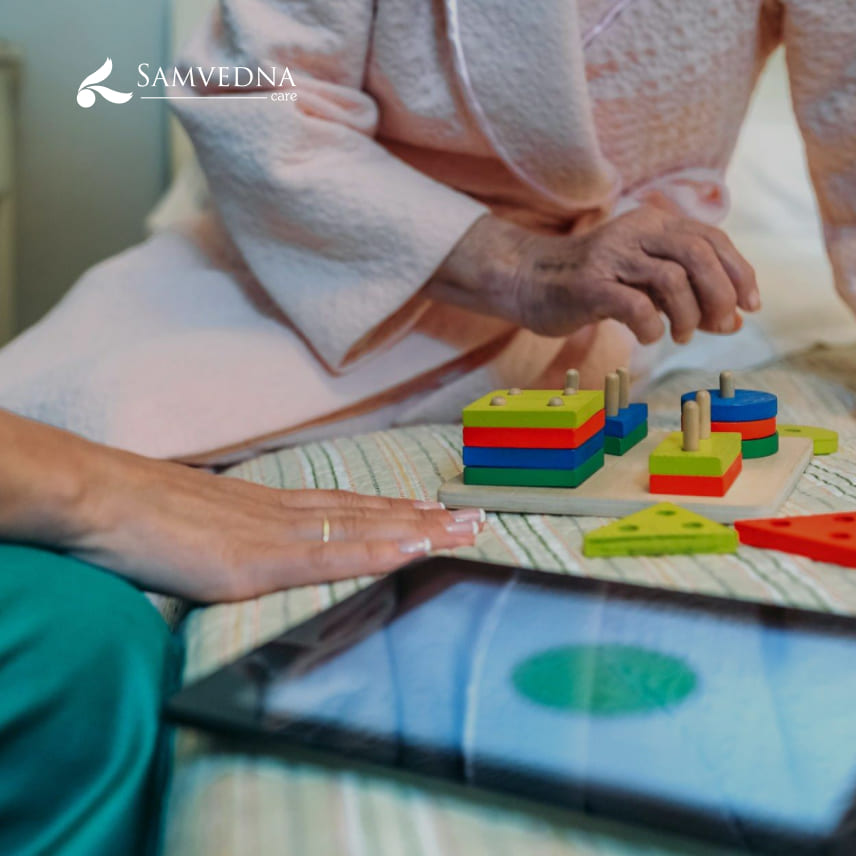“Exercise is the key not only to physical health but to peace of mind”
– Nelson Mandela
Exercising is beneficial for physical and mental health and may improve the quality of life for individuals in all stages of their lives. The benefits of exercises for maintaining physical health are already known but in recent years, there are evidences to suggest that exercise may also benefit those living with Alzheimer’s disease, potentially slowing the progression of symptoms.
Alzheimer’s require more than just medications to preserve cognitive abilities and quality of life. People with Alzheimer’s can benefit immensely from behavioural and environmental changes, reality orientation training, caregiver support, and other non-pharmacological interventions. Physical exercise may be yet another vital tool in the Alzheimer’s care plan.
Engaging a person with Alzheimer’s Disease in physical activities can enhance their quality of life and can help improve other health-related conditions. Samvedna Care recognises the importance of exercise for people with Alzheimer’s disease. In this blog, we will discuss the benefits of exercise for people diagnosed with Alzheimer’s disease.
- Exercise can improve cardiovascular health and strength. It helps in maintaining strong muscles and flexible joints and can help people maintain independence for a longer time.
- Physical activities can be useful in managing challenging behaviours such as wandering, restlessness, sun-downing and more.
- Improves cognitive function: Exercise is known to improve cognitive function in people with Alzheimer’s disease. Regular exercise helps to increase blood flow to the brain, which in turn promotes the growth of new brain cells and improves the overall functioning of the brain. This can lead to improved memory, thinking, and concentration in people with Alzheimer’s disease.
- Enhances social engagement: Exercise is a great way to enhance social engagement in people with Alzheimer’s disease. Participating in group exercises such as dancing, yoga, or tai chi can provide a sense of community and social support, which can improve the overall quality of life of people with Alzheimer’s disease.
- Physical activities can help re-establish old roles. Make use of skills that have not been forgotten, such as buttering bread, washing up or watering, sweeping and raking leaves in the garden. These are also ways in which the person with Alzheimer’s Disease can contribute to the household and feel useful.
Understanding the person with Alzheimer’s Disease will help you plan appropriate activities for them. This means knowing the person’s former daily regime, work history, interests, recreational and social interests, travel experience and other significant life events.
Samvedna Care’s elder care services recognize the importance of exercise for people with Alzheimer’s disease and provide personalized care and support services to help elderly individuals with Alzheimer’s disease stay active and engaged. Few tips to keep in mind while planning activities for Individuals with Alzheimer’s Disease as caregiver are the following.
- Try not to over stimulate them, avoid crowds, be selective with outdoor activities, and avoid noisy environment.
- Write a care plan for them, especially if different people are caring for them which will help in maintaining consistency.
- Care giver should focus on preserving residual skills.
- One should be sensitive of the person’s background.
- Provide them opportunities for enjoyment, pleasure and improving social contact.
- Prepare a safe working area for them.
Samvedna Care’s elder care services provide a range of other services to support the physical, mental, and emotional well-being of people with Alzheimer’s disease. These services include:
- Personalized care: Samvedna Care provides personalized care and support services to meet the unique needs of each individual with Alzheimer’s disease. The caregivers work closely with families to develop customized care plans that address the specific needs of the individual.
- Respite care: Respite care services provide temporary relief for family caregivers. Their caregivers provide in-home care and support services to ensure that the individual with Alzheimer’s disease receives the care they need while their family caregiver takes a break.
- Cognitive stimulation: Cognitive stimulation involves engaging in activities that challenge the brain and promote cognitive function. It is an effective way to slow down the progression of Alzheimer’s disease and improve the overall quality of life of people with the disease.
If your loved one is diagnosed with Alzheimer’s, contact Samvedna Care for information on support and treatment facilities available at the Centre.For more resources, check Samvedna Care’s website.



